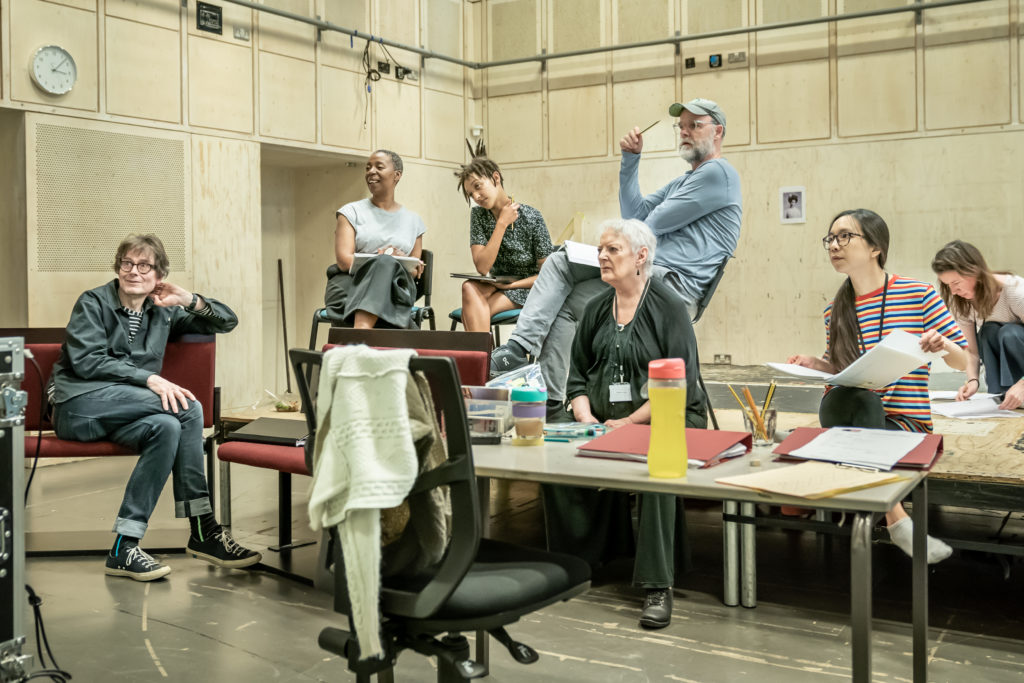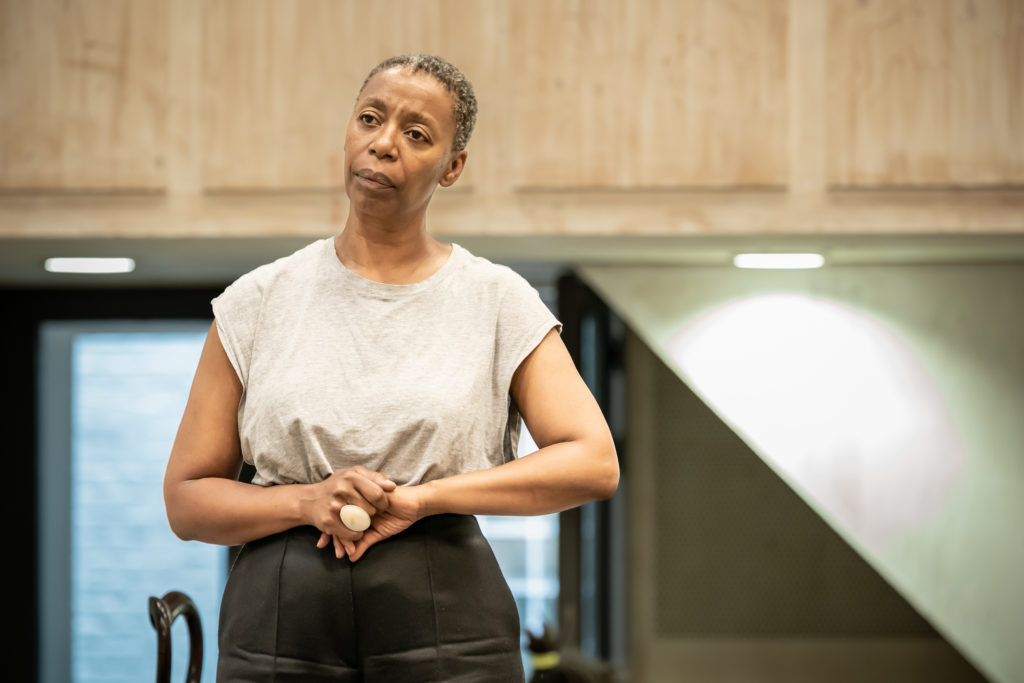DIVORCE has only been legal in Ireland since 1997.
That fact is always shocking on reflection and the absurdity of it is not lost on Brían F. O'Byrne right now.
If anything, it is very much at the forefront of the Cavan-born actor’s mind while in rehearsals for the UK premiere of Lucas Hnath’s A Doll’s House, Part 2 - which opens this week.
Hnath’s 2017 play picks up Henrick Ibsen’s ground-breaking 1879 drama A Doll’s House and moves the story on by 15 years.
Ibsen’s radical story, which ruffled many a feather at the time of its release, tells the tale of Nora Helmer, an unfulfilled married woman trapped in the patriarchal binds of a male dominated society in a Norwegian town in 1879.
The production - later claimed as a feminist masterpiece - ends with Nora finally making the decision to leave her family, to pursue a happier life for herself.
It was an unthinkable act for women in the real world at that time, nonetheless the final scene concluded with Nora bravely asserting her independence by closing the door on the life she was leaving behind.
That symbolic act, now widely referred to as ‘the door slam heard around the world’, came at a time when a feminist movement was beginning to emerge across the globe.
Hnath’s tale, which opened on Broadway in 2017 (receiving eight Tony Award nominations and winning one) sees Nora return to the family home more than a decade after she left.
“From the perspective of the play itself it’s a fascinating notion,” O’Byrne told The Irish Post this week.
“A Doll’s House was this extraordinary play at the end of the nineteenth century which caused a storm.
“It caused a stir in the world, the notion that a woman would just walk away from a marriage.
“But Ibsen didn’t tie it up in a bow and say, ‘then we find her destitute in the street’, or ‘she comes back pleading to come back to her former life’, that didn’t happen in the play,” he adds.
“Ibsen ended with the door slam that was heard around the world and it provoked such discussion, which is what good theatre is.
“So, this play starts with a knock on that door, Nora is back and it’s a fascinating premise – who is Nora now and what happened to her over the past 15 years?”
 The cast and director of A Doll's House, Part 2 in rehearsals
The cast and director of A Doll's House, Part 2 in rehearsalsThe award-winning Irish actor, who was based in the US for more than 30 years before returning to his homeland with his family five years ago, plays Nora’s husband Torvald.
Torvald is still living at the family home with their daughter Emmy, played by Patricia Allison, when Nora returns.
And Nora, played by double Olivier Award-winner Noma Dumezweni, is back for a reason - she needs divorce papers signed.
“In a way this play is kind of a modern take on things, it is kind of having a discussion with the original A Doll’s House,” O’Byrne explains.
“It is set in 1894, but there certainly is a modern feel to it.”
At just 90 minutes in length, with no interval, the Donmar Warehouse production, directed by James Macdonald, focuses on the interaction between Torvald and Nora as they attempt to navigate this next step in their estranged relationship.
“Torvald is a fun part to play,” O’Byrne admits.
“It is fun when you do a part where there are two opposing trains of thought – most of the scenes are just two people having a strong discussion with each other.
“Generally, Torvald and Nora have almost a wrestling match where they have to put forward their own points of view,” he explains.
“And I like the notion that Torvald is going into this play as the underdog, as Nora is such a hero of a character.
“It’s fun to be on stage and be able to go ‘gosh she just won that point’, that’s what it feels like – it’s like a sporting event in some ways, to win points off one another.”
There is of course the sensitive matter of their divorce on the cards, which, in the time when the play is set, is not an easy topic to tackle.
“There is a plot in the piece in that something needs to happen - something has brought Nora back to the house, she hasn’t just turned up to see what’s been going on since she left.
“But it is so surprising for Torvald,” O’Byrne admits.
“I have not had an experience where someone has just walked back into my life like that,” he muses.
But the actor is quick to point out that his character is not the villain of this piece.
“There are no villains in this play,” he says.
“It would be too easy to have villains, I am the only male in the play, but the male is not the villain.”
 Brían F. O'Byrne (Torvald) and June Watson (Anne Marie) in rehearsals
Brían F. O'Byrne (Torvald) and June Watson (Anne Marie) in rehearsalsHe adds: “Torvald is a good guy, which makes it more interesting I suppose.
“Now it’s all relative, of course, as he is part of the patriarchy, he is part of that.
“Certainly, the system benefits him in every way, being a male, but he is not some sort of Machiavellian person who is trying to keep women down or Nora in her place.
“That’s not who he is.”
So, what can we expect of Nora 15 years on?
“Nora is an incredibly smart, articulate person,” O’Byrne says.
“This Nora is very much the Nora from the first play, but she has gone on to make a life for herself.
“She has a modern feel, and the questions we are asking are modern too.
“So, she comes back, the door opens, and she looks a million dollars.
“She has done well for herself, she is a strong woman, a woman who made the right decision 15 years ago.”
He added: “It’s really interesting to see a strong independent woman who has left her family and children actually – and it’s uneasy at times.
“Even today we still have these bias against women - men can leave families and it’s seen as what men do, if a woman does it, it is still looked on negatively.
“So, there is something of a feminist message in there, that woman should be treated the same as men, it certainly opens up the debate on equality.
“You ask yourself does everybody have a right to be true to themselves even if it is at the cost of something else?”
Hnath’s play also deals with the ramifications of Nora’s decision to leave her family – which was shocking to audiences in 1879, when divorce was a relatively new concept.
“Divorce was always up to the man back then,” O’Byrne explains.
“Women could not get divorces, it was very difficult, but it was still up to the man to decide if there was a divorce.”
But the modern relevance of both A Doll’s House and A Doll’s House, Part 2 is also glaringly obvious, according to the actor.
“You know it was only about four weeks ago that no-fault divorce became legal in the UK – isn’t that shocking?” he asks.
“Isn’t it shocking that we as humans could not just say this relationship is not working and not have to jump through hoops to prove that to the government?
“It is also shocking to think that I was a late teenager when divorce became legal in Ireland.”
 Olivier Award winner Noma Dumezweni plays Nora in the production, which opens this week
Olivier Award winner Noma Dumezweni plays Nora in the production, which opens this weekReferencing Ireland’s Marriage Bar, a law which existed in Ireland until 1973, prohibiting married women from working, he adds: “Also, up until the 1970s, the Irish state said that once you had married, as a woman, if you had a job, you could no longer work, you lost your job.
“So, they took away any power that women had in Ireland.
“No divorce in Ireland. No contraception in Ireland.
“Women did not have the power to have bodily autonomy or have the right to say their marriage does not work.
“It was astonishing.”
O’Byrne is slightly more optimistic for Irish society today – having moved his family from Los Angeles to Sligo nearly five years ago.
“On the flipside of all of that, what has happened, the social change in Ireland in the last 25 years, is also astonishing,” he states.
“Take the abortion and gay marriage rights that came into effect recently, for example.
“This is where it gets very interesting, for these votes to happen, Ireland managed to tackle what could be considered divisive issues and it did not fracture society.
“That is an incredible achievement on both the ‘winners and losers’ sides.”
O’Byrne believes that was largely down to the existence of Ireland’s Citizen’s Assembly – a non- political body made up of members of the public which considers political issues and makes recommendations about them to the government.
“The Citizen’s Assembly – that is an astonishing thing, it takes the heat out of politics, and it allows people to talk together,” he explains.
“I think that is so, and I mean this progressively, so healthy for a democracy.”
He adds: “I think society in Ireland, with that Citizens Assembly, is moving in the right direction, which is astonishing in some ways, but there are vestiges, of let’s call it what it is, the Church, who are clinging on to power.
“And power is really just about money and property,” he explains.
“Which brings us back to the play - the play’s attitudes to women and the sanctity of marriage are really just a power play, in order to keep property within the patriarchy, and it’s the same with the Church.”
With opening night (June 10) looming for A Doll’s House, Part 2, O’Byrne is confident that the production is a good one and one which will get audiences talking.
“What is interesting about this play for audiences is that you don’t just walk out from the theatre going ‘ok what are we having for dinner’, that’s not your first thought - it’s more likely to be ‘right what do you guys think about this?’, ‘how does this relate to us now’,” he says.
“I think good theatre always holds a mirror up to the audience and this is a very good play.”
A Doll's House, Part 2 runs at London’s Donmar Warehouse from June 10 to August 6. For tickets click here or call 020 3282 3808

